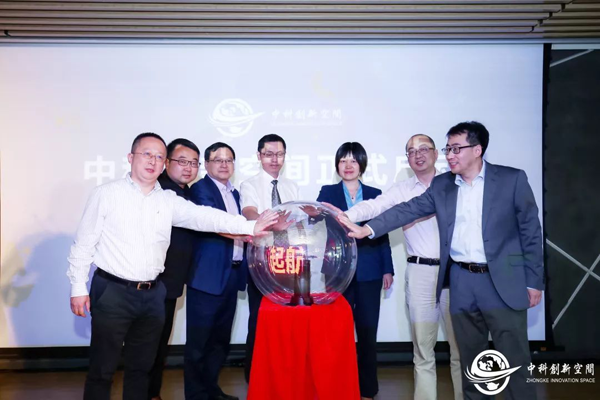Aerospace-focused innovation space lands in Zhangjiang

Authorities announce the launch of the Zhongke Innovation Space, an incubator focusing on the aerospace industry, in Zhangjiang Science City, Shanghai, on Oct 12. [Photo/WeChat account: zhangjiangfabu]
The launch of the Zhongke Innovation Space, a new incubator focusing on the aerospace industry, was announced at a press conference in Zhangjiang Science City, Shanghai, on Oct 12.
The innovation space, a joint effort of Zhangjiang and the Innovation Academy for Microsatellites of Chinese Academy of Sciences (CAS), will use the technological advantages of CAS in space science to promote technological innovation and application in the aerospace sector.
It will bring in Chinese and overseas start-ups specializing in system design, data application, and core parts R&D in the aerospace sector, provide them with professional entrepreneurship guidance, and help them transfer technological achievements and raise funds.
Wang Yang, head of the innovation space, said that it will focus not only on startup incubation but also the promotion of space science. It will launch various activities such as entrepreneurship competitions and forums to further expose space science to the general public.
Liang Xuwen, deputy director of the Shanghai Engineering Center for Microsatellites (SECM), said that they will develop the innovation space into an aerospace sci-tech innovation incubation platform with a global influence by investing in leading resources in technology, equipment and experts.
The Innovation Academy for Microsatellites, inaugurated in Zhangjiang last September, was built on the basis of SECM. It is dedicated to being an innovative engine for satellite technology, an aerospace technology transfer and industrialization base, and an open platform for international exchanges and cooperation.
The academy has several notable achievements to their name from recent years, including successfully launching 38 satellites such as the new generation of BeiDou Navigation Satellite, the Dark Matter Particle Explorer, and the Companion Satellite of the Tiangong-2 space lab.
It has also built long-term partnerships with many top research institutes such as the Shanghai Institute of Microsystem and Information Technology and the Shanghai Institute of Technical Physics.
Fu Jun, deputy director of Zhangjiang Mangement Bureau, vowed that Zhangjiang will create a better environment and provide better services for the development of the innovation space.
Zhangjiang, a high-tech hub in Shanghai, places a great emphasis on entrepreneurship and innovation. At present, the area has 86 incubators, housing more than 2,500 start-ups and covering a wide range of industries.


 China's public holidays for 2025
China's public holidays for 2025  Shanghai FTZ: Go all out to build China's first pilot zone for Silk Road E-commerce cooperation
Shanghai FTZ: Go all out to build China's first pilot zone for Silk Road E-commerce cooperation  Favorable policies boost 'China Travel' trend
Favorable policies boost 'China Travel' trend  play
play 